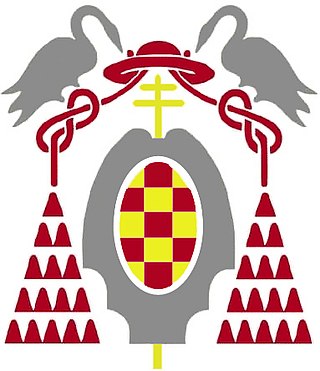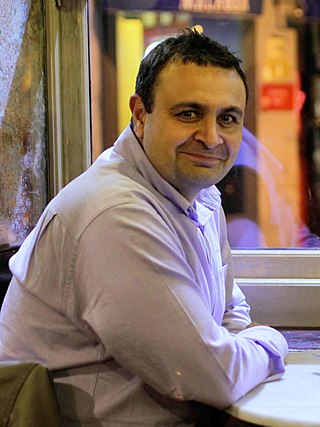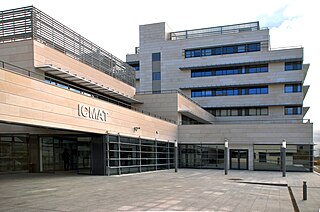Related Research Articles

The Complutense University of Madrid is a public research university located in Madrid. Founded in Alcalá in 1293, it is one of the oldest operating universities in the world. It is located on a sprawling campus that occupies the entirety of the Ciudad Universitaria district of Madrid, with annexes in the district of Somosaguas in the neighboring city of Pozuelo de Alarcón. It is named after the ancient Roman settlement of Complutum, now an archeological site in Alcalá de Henares, just east of Madrid.

Getafe is a municipality and a city in Spain belonging to the Community of Madrid. As of 2018, it has a population of 180,747, the region's sixth most populated municipality.

The Autonomous University of Madrid, commonly known as la Autónoma, is a Spanish public university located in Madrid, Spain. The university was founded in 1968 by royal decree. UAM is widely respected as one of the most prestigious universities in Europe. According to the QS World University Rankings 2022, UAM is ranked as the top university in Spain and has consistently ranked as #1 in Spain in the El Pais University rankings, published annually. Among its notable alumni, which include every president that the Supreme Court of Spain and Constitutional Court of Spain has had, is the current King of Spain, Felipe VI, who studied the Licenciatura en Derecho (Law) and is the president of UAM’s alumni society.

The University of Alcalá is a public university located in Alcalá de Henares, a city 35 km northeast of Madrid in Spain and also the third-largest city of the region. It was founded in 1293 as a Studium Generale for the public, and was refounded in 1977. The University of Alcalá is especially renowned in the Spanish-speaking world for its annual presentation of the highly prestigious Cervantes Prize. The university currently enrolls 28,336 students, 17,252 of whom are studying for undergraduate degrees, who are taught by a teaching staff of 2,608 professors, lecturers and researchers belonging to 24 departments. The administrative tasks are carried out by the university's Administration and Services, comprising approximately 800 people.
Juan José Linz Storch de Gracia was a German-born Spanish sociologist and political scientist specializing in comparative politics. He was Sterling Professor Emeritus of Sociology and Political Science at Yale University and an honorary member of the Scientific Council at the Juan March Institute. He is best known for his work on authoritarian political regimes and democratization.

Rey Juan Carlos University is a Spanish public research university located in the southern area of the Community of Madrid (Spain), with five campuses at Móstoles, Alcorcón, Vicálvaro, Aranjuez and Fuenlabrada.
Manuel García Pelayo, prominent Spanish political scientist and jurist. He was the founder of the modern Department of Political Science of the Central University of Venezuela and was elected President of the Constitutional Court of Spain in 1980.

José María Maravall Herrero is a Spanish academic and a politician of the Spanish Socialist Party.

Ignacio Sánchez-Cuenca is a Spanish social scientist based at the Charles III University of Madrid. He has been the director of the Instituto Carlos III-Juan March since its creation in 2013 from CEACS.
Miguel Angel Escotet is a social scientist, education administrator and author, emeritus professor at the University of Texas at Brownsville, of which he was dean of the College of Education. He was also secretary general of Organización de Estados Iberoamericanos and professor at Florida International University. He is since 2014 director general of corporate social responsibility of Abanca. He is also president of Fundación Galicia Obra Social, Afundación, and president of IESIDE, Afundacion's business school.

Juan Ignacio Cirac Sasturain, known professionally as Ignacio Cirac, is a Spanish physicist. He is one of the pioneers of the field of quantum computing and quantum information theory. He is the recipient of the 2006 Prince of Asturias Award in technical and scientific research.

The Centre for Political and Constitutional Studies, previously known as the Institute for Political Studies, is an autonomous agency associated with the Ministry for the Presidency of Spain.

Menéndez Pelayo International University is a public university with administrative headquarters in Madrid and campuses in Santander, Valencia, Barcelona, Cartagena, Cuenca, Granada, La Línea de la Concepción, Seville and Tenerife. The University also conducts classes at the Luis Seoane Foundation in A Coruña and the Huesca campus of the University of Zaragoza.

The Real Colegio Complutense at Harvard University, US: The RCC at Harvard is an academic institution aimed at providing intellectual exchange between Harvard and the Spanish Academia. It is located at 26 Trowbridge Street, Cambridge (MA).

The Institute of Mathematical Sciences is a mixed institute affiliated to the Spanish National Research Council (CSIC) in partnership with three public universities: the Autonomous University of Madrid (UAM), the Charles III University of Madrid (UC3M) and the Complutense University of Madrid (UCM). Founded in 2010, the ICMAT headquarters is located in the Cantoblanco Campus in Northern Madrid.

The Fundación Juan March is a foundation established in 1955 by Juan March, who was Spain's richest man. The foundation produces exhibitions as well as concert and lecture series. Its headquarters in Madrid houses a library devoted to contemporary Spanish music and theater. It owns and operates the Museo de Arte Abstracto Español, in Cuenca, and the Museu Fundación Juan March, in Palma. Its Center for Advanced Study in the Social Sciences, which has granted nearly one hundred doctoral degrees to Spanish students, is currently incorporated within the Instituto mixto Carlos III/Juan March de Ciencias Sociales at the Charles III University of Madrid.

Ana de Miguel Álvarez is a Spanish philosopher and feminist. Since 2005 she has been a titular professor of Moral and Political Philosophy at King Juan Carlos University of Madrid. She directs the course History of Feminist Theory at the Complutense University of Madrid's Instituto de Investigaciones Feministas.
Julio Aróstegui Sánchez (1939–2013) was a Spanish historian. Professor at the Complutense University of Madrid (UCM), some of his research lines included the study of political violence in Modern Spanish history, Carlism, the Spanish Transition, the Spanish Civil War, the history of the workers' movement and collective memory. His scholar production also intertwined with the theoretical problems of history and the methodology of research.

The Faculty of Social Sciences, commonly and informally known as Sociales, is the social sciences faculty of the University of Buenos Aires (UBA), the largest university in Argentina. It was founded in 1988, and offers degrees on social work, sociology, labor relations, communication and political science, in addition to a number of post-graduate degrees.

Gloria Begué Cantón was a Spanish professor, jurist, senator and magistrate. She was the first female law school professor in Spain and was a law educator at Complutense University of Madrid and the University of Salamanca.
References
- 1 2 3 "History". IC3JM. Retrieved 10 February 2018.
- ↑ "Ignacio Sánchez-Cuenca CV" (PDF). Carlos III University. Retrieved 10 February 2018.
- ↑ Juan March Institute website. Accessed January 27, 2008
- ↑ Juan March Institute's Scientific Committee website. Accessed January 27, 2008
- ↑ "European Political Science - Spring 2004, issue no. 3.2". Archived from the original on 2008-07-29. Retrieved 2008-03-19.